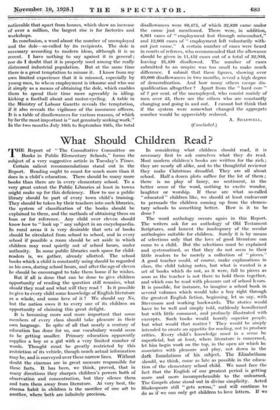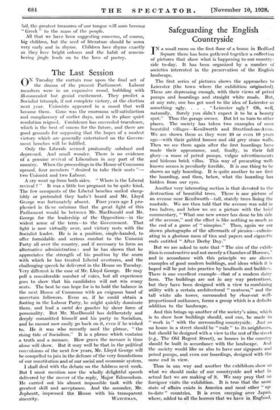What Should Children Read?
THE Report of "The Consultative Committee on Books in Public Elementary Schools," forms the subject of a very suggestive article in Tuesday's Times.
Certain salient recommendations stand out in the Report. Reading ought to count for much more than it does in a child's education. There should be many more books than there are in every elementary school. To a very great extent the Public Libraries at least in towns might make up for this deficiency. How to use a public library should be part of every town child's training. They should be taken by their teachers into such libraries, the system of classification of the books should be explained to them, and the methods of obtaining them on loan or for reference. Any child over eleven should know how to "look up" any subject in an encyclopaedia. In rural areas it is very desirable that sets of books should be circulated from school to school, and in every school if possible a room should be set aside in which children may read quietly out of school hours, under authority. In some public libraries such space for child- -readers is, we gather, already allotted. The school books which a child is constantly using should be regarded as his own, during school hours, and after the age of eleven he should be encouraged to take them home if he wishes.
But if all is done that can be done to give children opportunity of reading the question still remains, what should they read and what will they. read ? Is it possible to give to every child some knowledge of English literature as a whole, and some love of it ? We should say No, but the nation owes it to every one of its children an opportunity of claiming this great delight.
It is becoming more and more important that some members of every class should take pleasure in their own language. In spite of all that nearly a century of education has done for us, our vocabulary would seem to be getting smaller. Primary education apparently supplies a boy or a girl with a very limited number of words. Thought must be greatly restricted by this restriction of its vehicle, though much actual information May be, and is conveyed over these narrow lines. Without doubt the cinemas are in great measure responsible for these facts. It has been, we think, proved, that in many directions they sharpen children's powers both of observation and concentration, but they silence them and turn them away from literature. At very best, the cinema habit in children is the sacrifice of one art to another, where both are infinitely precious. In considering what children should read, it is necessary first to ask ourselves what they do read. Most modern children's books are written for the rich ; they are nearly all alike, and to the thoughtful reviewer they make Christmas dreadful. They are all about school. Half a dozen plots suffice for the lot of them ; there is no play of fancy, no sentiment, in the better sense of the word, nothing to excite wonder, laughter or worship. If these are what so-called " educated " children like, we should at least endeavour to persuade the children coming up from the elemen- tary schools to something better. How is it to be done ?
The word anthology occurs again in this Report. The writers ask for an anthology of Old Testament Scriptures, and lament the inadequacy of the secular anthologies suitable for children. Surely it is by means of selections only that the love of good literature can come to a child. But the selections must be explained and systematized, so that they do not seem to their little readers to be merely a collection of "pieces." A good teacher could, of course, make explanations in class, the child taking notes, but what is wanted is a set of books which do not, as it were, fall to pieces as soon as the teacher is not there to hold them together, and which can be read with pleasure out of school hours. It is possible, for instance, to imagine a school book in several volumes which would take a boy right through the greatest English fiction, beginning, let us say, with Stevenson and working backwards. The stories would have to be well and simply told, ruthlessly bowdlerized but with little comment, and profusely illustrated with excerpts. Such books would horrify superior people, but what would that matter ? They would be simply intended to create an appetite for reading, not to produce critics. Every child's knowledge must in a sense be superficial, but at least, where literature is concerned, let him begin work on the top, in the open air which he associates with pleasure and play, not down in the dark foundations of his subject. The Elizabethans should, we think, come as late as possible in the educa- tion of the elementary school child. We must face the fact that the English of our greatest period is getting more and more incomprehensible to the unlearned. The Gospels alone stand out in divine simplicity. Acted Shakespeare still "gets across," and will continue to do so if we can only get children to love letters. If we fail, the greatest treasures of our tongue will soon become " Greek " to the mass of the people.
All that we have been suggesting concerns, of course, big children, but the seed of literature should be sown very early and in rhyme. Children love rhyme exactly as they love bright colours and the habit of remem- bering jingle leads on to the love of poetry.













































 Previous page
Previous page